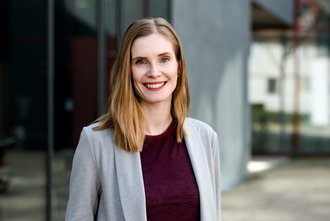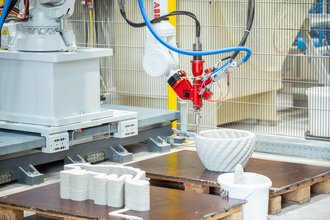Building Block of the Future: Adaptable, Intelligent Concrete
Concrete is the 21st century’s most important building material. At the Bauhaus-Universität Weimar, it is being further developed and brought into a new era with the »StimuCrete« research project. With the help of innovative additives, the plan is to develop an intelligent concrete that is adaptable in both its fresh and solid states. This innovation aims to boost digital, automated construction and to increase the service life of buildings. The Federal Ministry of Education and Research will be funding the NanoMatFutur research group, led by Luise Göbel, Junior Professor of »Werkstoffmechanik« at the Faculty of Civil and Environmental Engineering, with nearly 1.9 million euros until 2028.
Long-lasting, robust, malleable - concrete is a high-performance material composed of cement, gravel and water. By mixing in additives such as retarders, accelerators or plasticisers, the material properties of fresh or hardened concrete can be selectively influenced. The problem? Once it has been determined in the mixing process, the concrete can no longer be adjusted. However, changing environmental conditions and fluctuations in raw materials often lead to changes that can unintentionally influence the flow behaviour and resistance of concrete. Jr. Prof. Luise Göbel’s research team is hoping to make concrete more intelligent. The idea: By mixing in innovative additives, which can be internally or externally activated, it should be possible to actively influence selected properties of the concrete — even after it has been produced.
Activating Material Properties as Required
The »StimuCrete - Funktionalisierung von Betonstrukturen durch stimuliresponsive Materialien« will be taking two approaches over a five-year period. Initially, it should be possible to actively control the behaviour of fresh concrete. This would allow the material to solidify at the touch of a button, for example. »This is particularly important for automated production processes, including 3D concrete printing«, says Luise Göbel. The group plans to achieve this intelligent material behaviour by developing additives that change as a result of electromagnetic excitation, thus influencing the properties of fresh concrete.
The interdisciplinary team, made up of materials scientists, chemists, and an electrical engineer, is also looking for new ways to improve the durability of concrete structures. New types of capsules, which are added to the material and open in the event of damage, are being developed for this purpose. This will allow microcracks in the concrete to heal themselves and the reinforcement will be protected against damaging agents. »Self-healing concrete makes structures more resilient and reduces the need for manual repairs. This will save resources and protect the environment in the long term«, emphasises the junior professor.
Promoting Early-Career Researchers Through the BMBF
The BMBF »NanoMatFutur« competition for early-career researchers allows researchers to establish their own independent research groups at research institutions in Germany. The research, which is both innovative and interdisciplinary, should be in a practically-focussed research field with a recognisable connection to industry. They incentives for innovative developments in a wide range of material science topics, ranging from energy technology, mobility and transport, to health and quality of life, as well as battery technologies. Luise Göbel of the Bauhaus-Universität Weimar was the only individual to be awarded the prestigious funding for the field of »Zukünftige Bausysteme« (future building systems).
Project:
StimuCrete - Funktionalisierung von Betonstrukturen durch stimuli-responsive Materialien (making concrete structures functional through stimuli-responsive materials)
Duration:
1 January 2024 to 31 December 2028
Funding:
1,939,896.00 Euros, third-party funding from BMBF
Contact: Jr. Prof. Luise Göbel Bauhaus-Universität Weimar, Faculty of Civil and Environmental Engineering F.A. Finger-Institute for Building Material Engineering Department of »Werkstoffmechanik« Coudraystraße 11A, 99423 Weimar Phone: +49 (0) 3643 / 58 4250 E-mail: luise.goebel@uni-weimar.de
Kontakt
Bauhaus-Universität Weimar
Claudia Weinreich
Pressesprecherin
Tel.: +49(0)3643/58 11 73
Luise Ziegler
Mitarbeiterin Medienarbeit
Tel.: +49(0)3643/58 11 80
Fax: +49(0)3643/58 11 72
E-Mail: presse[at]uni-weimar.de
Web: www.uni-weimar.de/medienservice



